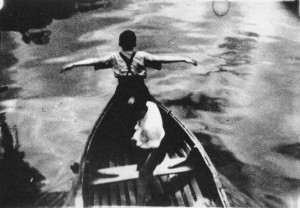
"An impressionistic portrait of city life during a day off in the summertime, with poetic narration set opposite some very observant and intimate views of Vancouver and its inhabitants. These include numerous street scenes; departure of the passenger ferry 'Hollyburn'; shots of and from Interurban railway and streetcars; sequences on Chinatown, Kitsilano Beach, Stanley Park, Victory Square, and the downtown waterfront; and a glimpse inside a typical beer parlour. The film received honourable mention in the amateur category at the 1950 Canadian Film Awards." (BC Archives)
Opening credit reads: "The Vancouver Branch of the National Film Society presents..."
Additional credits (on 1986 restored version): "Restored 1986 by Dennis J. Duffy for National Film Week '86 in co-operation with Canadian Filmmakers Distribution West and the Provincial Archives of British Columbia. Restoration funded by BC Heritage Trust."
"Film is about the efforts a husband and wife take to make a lifetime supply of ink, only to find that it isn't worth it. Written, directed, acted, photographed by Charles (Dr. Charles E. Phillips) and Jean Phillips" Archives of Ontario.
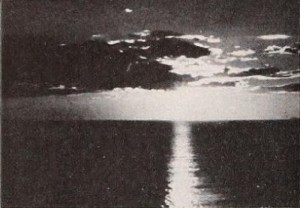
"In the Beginning is a title that appears for the second time in these lists, for this film is a new version of a picture by the same name that was produced in 1935 by Fred C. Ells. The first picture was filmed in black and white when Mr. Ells was working in Japan, and the second picture was made in color in this country. In the Beginning tells, with extraordinary beauty, the story of Creation in the Book of Genesis, and it is climaxed by the creation of man and his works. It is a symphonic film of water, earth and of nature, graced by the cinematic skill and artistry familiar to all who have seen Mr. Ells's work. He has the gift of exquisite motion picture composition and distinctive choice of precise subject matter to which, in this picture, is added a unique control of color. Some of the scenes of birds forming moving patterns on the sand are astonishing, both in composition and in color effect. Back lighting, slow motion and the telephoto lens are tools that Mr. Ells uses frequently, but never for their obvious effect. They are but part of the magic by which he takes his audience back to the days of Creation." Movie Makers, Dec. 1942, 506.
"In the Beginning, although far from being a perfect picture, is nevertheless one of the few truly great films thus far to come from a motion picture camera — either theatrical or amateur. Here, the magnificent beauty and awesome strangeness of the natural world have been seen in their fundamental and ultimate meanings. As an interpretation of the epic story of creation, In the Beginning follows directly in the noble tradition of Homer, Dante and Milton. One is left stilled and humble before the simple purity of imagination which conceived it. To this superb document of nature, F. C. Ells, ACL, the producer, has brought a technical skill and sensitive craftsmanship more than equal to the demands of his subject. Using as his titles direct quotations from the first chapter of Genesis, Mr. Ells has added a subtle undertone to the beautiful King James English by the use of primitive, geometrical symbols (indicative of fire, rain, infinity, etc.) for his title backgrounds. Somber and stunning scenes of the heaving waters, the new born earth and bursting streams in the first reel are followed, in the second, by flawlessly executed telephoto and macroscopic studies of the earth's myriad creatures. Integrating the entire production is a musical accompaniment of stately church music, recorded on disc by the Sistine Choir. Mr. Ells, who has looked upon the earth and found it good, has produced a sincere and beautiful film, great even as it falls short of perfection." Movie Makers, Dec. 1935, 550.
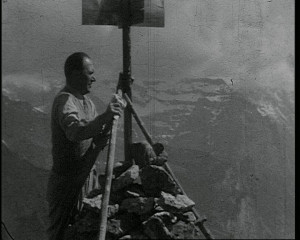
"Holiday footage taken by Laurie and Stuart Day during a fortnight’s break in the Swiss Alps prefaced by, and concluding with, scenes involving Laurie and Stuart Day at home in Stoke on Trent" (EAFA Database).
"Another documentary - travelogue in Esther Cooke's usual style of presenting in an easy way a phase of an old European town. This time old Rothenburg, with its ancient buildings and customs, and pageants re-enacting the past. In the village square there are interesting colorful patterns danced by the young folks. The narrations fills in interesting historical sketches contributing a great deal to the picture. This might be a citadel taken from the pages of a story book" PSA Journal, Nov. 1959, 47.
"Humorous scene is at a sophisticated party where a man is trying to impress a woman with his knowledge of world affairs-contradicting himself in the process. She is not impressed but he doesn't realize it."-W.W. via the Film-Makers' Co-operative.
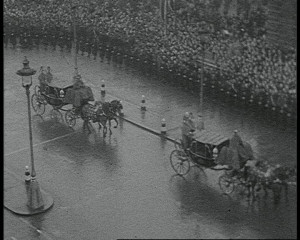
"Scenes of the preparations in Parliament Street and Whitehall an hour before the funeral procession and the procession itself filmed from an upper storey window in Parliament Street" (EAFA Database).
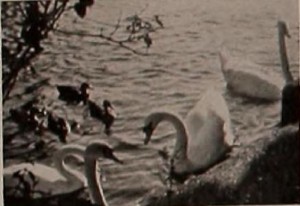
"In Linden Lea is A. Scott Moorhouse's tribute to a mother land, a tribute paid with distinction and an admirable warmth of feeling. We go to the English countryside, where Mr. Moorhouse sings, in film, the ancient refrain that Chaucer, Shakespeare, Gray, Wordsworth, Jefferies, Kipling and Brooke lifted in the English tongue. It is Mr. Moorhouse's good fortune and his sound cinematic ability that have permitted him to bring what he feels so strongly in a very direct fashion to his audience. His is the last sight of a peaceful England, recorded with vibrant emotion. "Rainbows; and the blue bitter smoke of wood; "And radiant raindrops couching in cool flowers; "And flowers themselves, that sway through sunny hours, "Dreaming of moths that drink them under the moon; " These, Mr. Moorhouse has greatly loved, as did Brooke, and in English woods, he would hope we shall "see no enemy, but winter and rough weather." In this beautiful Kodachrome footage are preserved the byways, the little ways, the errant and individual ways through which wander the casual cows, the meandering motors, the clopping carts and the quiet English, themselves, while to right of them and left of them are "English unofficial roses." And there is "honey still for tea" in this English land, and people to enjoy it, unhurried and unflurried. Mr. Moorhouse has pictured a way of life by suggestion, because his scenes are almost all with few human beings, but he has pictured it sharply and triumphantly, even if tenderly. In this brief essay in film is the essence of "This royal throne of kings, this scepter'd isle, "This earth of majesty, this seat of Mars, "This other Eden, demi-paradise; "This fortress built by Nature for herself "Against infection and the hand of war; '"This happy breed of men, this little world; "This precious stone set in the silver sea . . . "This blessed plot, this earth, this realm, this England." Movie Makers, Dec. 1939, 609, 631-632.
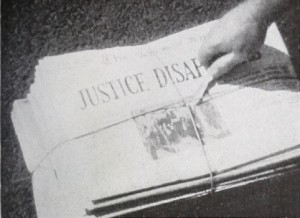
"The 1944 Hiram Percy Maxim Memorial Award film, In His Own Judgement, is the distinguished expression of the mature thought of a generous, broad and rich mind. With all the individualism of Henry Thoreau, whose philosophy the picture exemplifies, Joseph J. Harley has lifted up his eyes unto the hills and to the lonely places of nature and has brought from them a finely sincere, dramatic story that declares his own credo of man's healing.The tale is simple. A jurist, on the verge of a nervous collapse, disappears and finds refuge from terror and confusion in a lonely wooded retreat. Almost identified, after some years, by two young girls who meet him by chance, he tells them the tale of "a missing judge" in retrospective sequences. Although nearly convinced that he is the long sought man, they decline to earn the reward offered for news of him and leave him in peace. In cinematography, direction, action, dramatic construction and realization of beauty, Mr. Harley's film is of high quality. The tense horror of the overworked jurist in the crowded city is followed by the rest which he finds in solitude. The words of the Psalms comfort him and bring him "peace at the last." They are exquisitely read in a special recording. Mr. Harley was greatly aided in his two long years of labor on the picture by the fine and sincere work of his brother in law, Charles Hooker, who assumed the role of the judge with authority and restraint. The whole film is beautifully integrated by phonograph with the music of Dvorak's violoncello concerto in B minor, Liszt's Les Preludes, Goldmark's Rustic Wedding Symphony, Brahms's Tragic Symphony, Sibelius's Karelia Suite and one of the Slavonic dances of Dvorak. These provide the sole musical contribution. Mr. Harley, an engineering executive for a large corporation, has put into this remarkable film a breadth of culture acquired in two continents, the authority of a man who has looked at life and has come to conclusions about it and the creative fire and disciplined achievement of a real artist." Movie Makers, Dec. 1944, 476-477.
Total Pages: 299